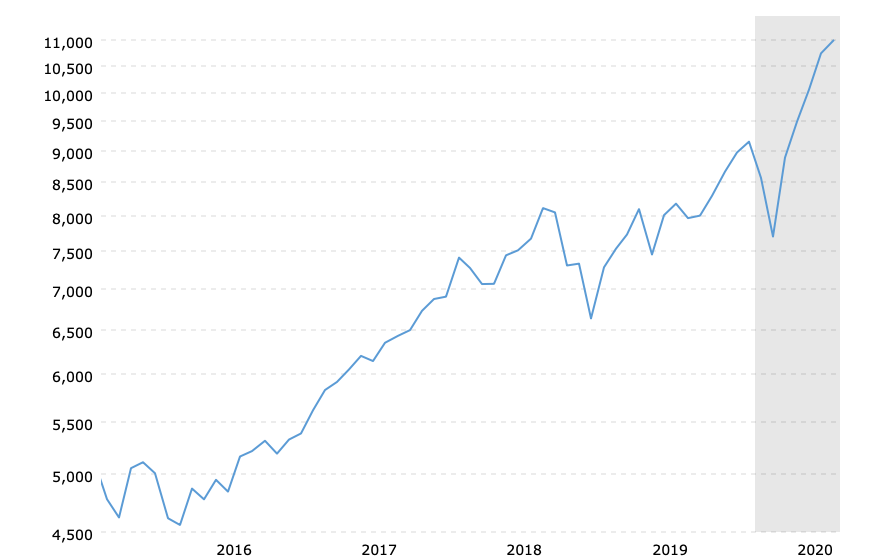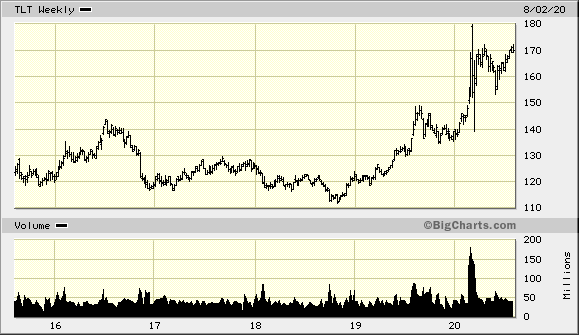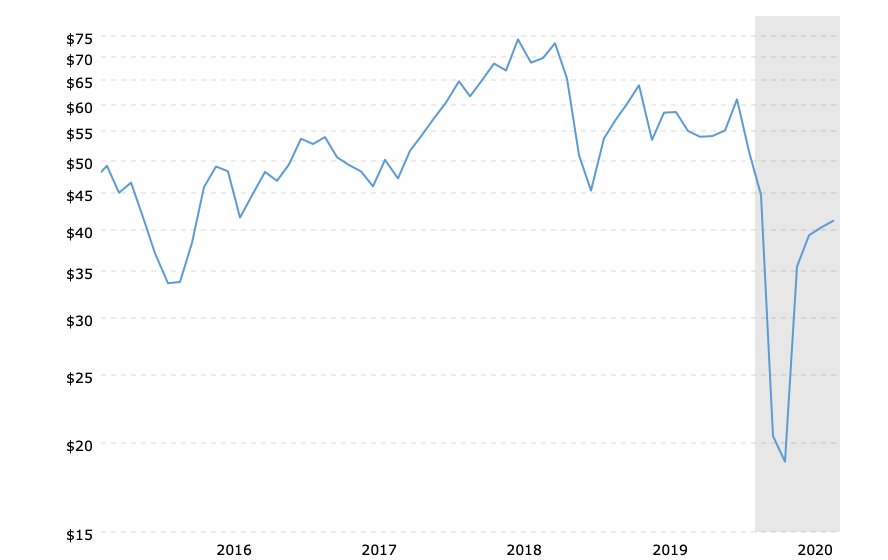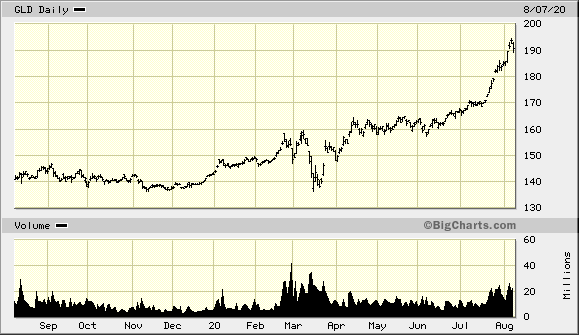Asset Price Crash Dead Ahead?
An All-Asset Price Crash (AAPC) might be the next "Wow! Can you believe it?"
In the meantime, whether it be stocks, bonds, gold, or oil, investors are licking their chops and counting their profits before they are booked. And, they have reason to gloat. Let's see what all the noise is about.
STOCKS
Since the stock market lows less than five months ago, the Nasdaq Composite Index is up 66 percent. At its most recent intraday high of 11,126, it is nearly twelve percent higher than it was before falling by one-third this past March.
Any fears from investors about "technical damage" created by the previous price collapse have been swallowed up by the recent huge gains in the index. Here is what it looks like on a 5-year chart...

(source)
The broader market as represented by the S&P 500 Index is up fifty-two percent. It has not broken through its previous high of just under 3400 prior to its March price collapse, but is knocking at the door right now. Stocks have regained all of their recent losses and, in some cases, more. At this writing, they appear on the verge of moving much higher for quite some time. Maybe.
BONDS
In the short space of ten days in March, bond prices (TLT - 20+ year Treasury Bond ETF) dropped by 22 percent. This was followed by an almost immediate, identical 22 percent increase, which brought bond prices back to within five percent of their former high point. Below is a five-year chart (source) of TLT...

OIL
During the February-March selling spree, oil dropped from a high of $63.00 per barrel to a low of $11.00; a decline of more than eighty percent. Ever so briefly, the spot price for crude oil even approached zero. Currently, oil is at $41.00, an increase of two-hundred seventy-two percent from its low of $11.00 a few months ago. The chart (source) below tells the story...

Oil prices dropped much further than stocks. The percentage decline was more than twice as much for oil and, if we use the brief intraday low of $0, then oil's decline was three times greater than stocks.
Oil has out performed stocks on the upside by more than four-fold since the lows in late March, but it is currently thirty-five percent below its previous high.
GOLD
As for gold, its price dropped along with everything else, although not as sharply. After declines of nearly fifteen percent, gold has rebounded almost forty percent to new all-time highs in nominal terms. Below is the five-year chart (source) of GLD - Gold ETF...

The rush to dump financial assets in March 2020 threatened the fragility of our monetary system. The cracks in its framework widened into chasms. Nothing was spared.
Silver declined as much as stocks and fell to a new post-2011 low. Gold stocks dropped by more than 50 percent.
Then, to the cheers of politicians, investors, actors, and comedians, the Federal Reserve rode its white horse to the front lines and dispensed life-giving sustenance to the battle-weary troops.
After that, it was off to the races.
And, like before, when every asset class had dropped in tandem; they all rose together, too. Not just a little, either. Financial assets denominated in US dollars went up big time.
Last spring some folks who predicted that the US stock market was about to collapse, seemed to anticipate the actual event with a degree of eagerness. At least, that appeared to be the case with those who had also predicted that a huge decline in stocks would result in a huge increase in the price of gold. Similar claims were made about silver, too.
There are various conflictions in the arguments put forth by others about the 'fundamentals'. And there are numerous explanations that just don't quite make sense.
The bottom line is that all financial assets were rising in the early part of this year. Then, they turned on a dime and collapsed together. After unprecedented (how many times can we use that term to describe each succeeding action by the Fed?) action by the Fed, all assets began rising together.
Some have outdistanced others, and their supporters tell us that there are "fundamental" reasons why. But if those fundamentals are valid, why then did they not manifest themselves before? And why "are things different this time?"
There is one common denominator to all financial assets relative to their price action - the Federal Reserve.
The credit collapse in 2007-08 saw similar financial asset price action. Everything dropped, then everything rose - after intervention from the Fed. All assets, including gold, benefited from Fed largesse. (see Gold Market Manipulation And The Federal Reserve)
The devastating economic consequences of policies and regulations in response to Covid-19 was the most likely trigger in the selloff of financial assets. A shutdown of almost all economic activity prompted (and forced) individuals, small businesses, and corporations to attempt to raise cash.
The Fed acted quickly; mostly out of fear. Those in command had known for sometime that something was about to happen.
The conditions in overnight money markets, repos, etc. had made this abundantly clear: there is a shortage of cash.
It is the fervent hope of those in control (sort of) at the Federal Reserve, that by market intervention (primarily buying up bonds of all kinds, and keeping credit cheap) they can drive asset prices higher and hopefully direct attention to higher stock and bond prices.
Presumably, and hopefully, that would take some of the focus away from the poor state of the economy; which is now bad enough that most projections allow for weak, and maybe weaker, economic activity to last for at least a couple more years.
That kind of thinking implies that the worst may be behind us. Unfortunately, it is probably not.
Think about it. We are currently experiencing the worst economic conditions since the Great Depression. And with every "unexpected" financial event since the Great Depression, the volatility is greater and the consequences more damaging, more extreme, and longer lasting; and they occur more frequently.
It is not just the fact that economic conditions will probably worsen and that stocks will probably reflect this. At least there is some hope that time will have a healing effect; and if conditions improve and get better, maybe somewhere along the line the stock market will have some justification for its ridiculously high valuations.
As the common denominator in the formula for prices of all financial assets, the Fed is now the buyer of last resort. All assets have risen based on Federal Reserve market intervention.
Owning financial assets now makes no sense. Why would you want to own stocks and bonds that only go up because the Fed is expected to come to the rescue if something goes wrong? Fundamentals! What fundamentals?
The four specific financial assets we reviewed - stocks, bonds, oil and gold - are uncorrelated and different in their fundamentals. Yet, they have moved nearly in tandem for more than a decade. Stocks, bonds, and gold are at, or close to all-time highs.
Not withstanding the Fed's prolific money creation, there is a big risk that they will fail in their efforts to prop things up and hold things together.
That risk takes the shape of a massive tidal wave called deflation; not a slowing of inflation, but a literal reversal of everything we have come to know and expect (love?).
The forces of deflation are growing stronger and the next collapse in prices won't be for one-third of current prices. Next time it will likely be drops of seventy-ninety percent.
As bad as watching the stock market drop by 70 percent sounds, the economic fallout will be much worse. Bankruptcies and unemployment could be at least twice as bad as anything we have seen before. With possibly 30-50 percent unemployed, bank failures, and bankruptcies, it could last for a decade or longer.
If there is a bright side, it is that the US dollar would gain purchasing power. The cost of things you normally buy and use would drop in price corresponding to the extent of the deflation.
However bad things get, they will be made worse by government and central bank efforts to stem the tide. And, they will last longer.
Government hates deflation. And not because of any perceived negative effects on its citizens. It is because the government loses control over the system which supports its own ability to function. Inflation, fractional-reserve banking, enhanced supplies of money and credit are intentional creations of governments and central banks. They are used to fund and reinforce the operation and grandiose plans of government and the big banks.
Hence, we can expect government to respond decisively to any series of events which resemble those previously described. Their intentions would be clear. All efforts would be structured in similar fashion to those employed in our previous brushes with financial disaster.
The events themselves are a logical end result of a financial system which has overdosed on artificial stimulation; not entirely dissimilar to an addict's reactions to long-term drug abuse.
Since each successive financial 'fix' requires a stronger dose to maintain the expected results, and since the ongoing systemic damage is cumulative, we reach a point that demands recognition of the problem, and then painful steps to resolve it successfully. The government and the Federal Reserve will never acknowledge the harm their policies have caused. And they will never take the steps necessary to right a sinking ship.
Regardless of the possible conditions that could accompany another Great Depression, all financial assets are extremely vulnerable to some huge retracements in price; if not outright collapse.
Kelsey Williams is the author of two books: Inflation, What it is, What It Isn't, And Who's Responsible For It and more




This article is rather disturbing and seems to paint a rather bleak future. And unfortunately indeed it certainly seems correct. THAT is rather unfortunate. One possibe step in the right direction might be to terminate every person in the federal reserve system WITH EXTREME PREJUDICE, so that it would be known to all that it was the long string of wrong choices that caused the problem, AND that others making the same wrong choices would quickly be quickly ejected out the same door. Helping one's friends is OK if it is only one's personal wealth being used, but to saddle unborn generations to a crushing level of debt indicated willful abuse of power. (I stop my rant here, not done, just stopped)
Very disturbing indeed!
A collapse of the capitalism structure based on credit for everything will affect assets and currencies. Does the fed have a margin before the collapse of dollars?
No, except selling gold which will have, like we can see, a fundamental to go up.
The last drop of gold was may be the first mark of high move from fed for not letting gold reflecting the distrust in the system.
Gold is the last one to die on the battlefield.
Deflation can impact gold too. And deflation is difficult for homeowners and those with installment contracts. Wages could decline, as happened in the Great Depression. It probably won't happen but it could. And the contracts remain unchanged, and difficult to repay.
Central banks or i would say gov. rely on inflation in order to "repay" their debt on the long run. Deflation is a failure of the capitalism but printing like they do and the dollar loosing its international appeal will be more likely on inflation side. I don t exclude a huge crash over the bill of morphine injected into the patient..overdose!!!
Too many have been brainwashed by austerity peddler Mitch McConnell. Jmo.
Good point.
All things in the financial markets tend to revert to the mean. So it would be no surprise to have deflation in the near future to offset the years of inflation we have had over the past 20+ years.
Does that take into account the money printing? I don't think you can use the 'revert to the mean' if you keep adding an asset to an ever growing pool of the same. Would be nice though, then we could print ourselves into wealth.
Yes, good point.
"Why would you want to own stocks and bonds that only go up because the Fed is expected to come to the rescue if something goes wrong?"
Let me fix that:
I want to own stocks and bonds (and gold) because they go up because the fed comes to the rescue when something goes wrong.
:-)